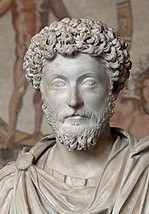Level B2 and above
Stoics prized rational thinking, acting on good information and contemplating a situation fully rather than reacting in panic and anxiety.
- With videos, vocabulary, quotes and exercises.
Now is the time to be stoic
Welcome to English in the Pandemic # 4
Today we examine the philosophy Stoicism founded in Greece in the third century B.C and practised by the Romans. Because now is the time to be stoic.
As Benedicte writes below:
Stoics prized rational thinking, acting on good information and contemplating a situation fully rather than reacting in panic and anxiety. Stoics, like the Roman emperor, Marcus Aurelius, did not allow his thoughts to be invaded by negativity and emotions.
Stoics were calm, focused and courageous in the face of extreme difficulty. The founder of the Stoic philosophy Seneca said:
“We are often more frightened than hurt;
and we suffer more in the imagination than reality.”
You can read more famous quotes about Stoicism below and also watch a Ted video lesson about Stoicism (with or without French sub-titles).
How stoic are you? How important is it to be stoic in the time of the pandemic?
We welcome your comments and feedback in the commentaires section below.
Now is the time to be stoic… and do the vocabulary exercises below.
But first, here are some time-lapse pictures of the forest in Australia, after the horrendous fires earlier this year.
Return of the green in Australia

Photos: Sorrel Wilby
A Time for Stoicism
Level: B1 – C2
I feel it is time I became a full-time stoic. See the world differently. Be the master of my own perceptions.
In everyday English, a stoic is a person who can endure pain and hardship without complaining. The word stoic can also be used to describe someone who is indifferent to pain, pleasure, grief, or joy – in other words, emotionless.
But stoicism means much more than that.
It is the way we see
things which causes
most of our trouble
Stoicism was the most popular philosophy in ancient Rome. It says that virtue can make you happy. And virtue is self-control, courage, justice, and wisdom. Furthermore, stoicism says it is the way we see things which causes most of our trouble.
The Stoic school of philosophy was founded in Athens by Zeno in the third century B.C. It was then adopted by the Romans, who loved this philosophy because they found it very practical for daily life. The three main Stoic philosophers in Rome were Seneca, Epictetus, and Marcus Aurelius. Many great minds, to the present day, have since relied on Stoicism to manage their lives.
One of the great practices in Stoic philosophy is understanding what we can change and what we cannot change. For example, if your flight has been delayed indefinitely, will you accept it, or will you yell at the airline representative? If you want to yell, remember the famous – and very stoic – Serenity Prayer:
God, grant me the serenity to accept the things I cannot change,
courage to change the things I can,
and wisdom to know the difference.
Another principle of stoicism is right action. We may have an idea of what we want to achieve, but do we act accordingly? As Epictetus said: “First tell yourself what kind of person you want to be, then do what you have to do.” It takes work, it takes practice, and it takes perseverance. It is not enough to just wish and hope.
What doesn’t kill me
makes me stronger
Then there is the discipline of will. Stoicism requires that you show resilience, kindness and acceptance. We must always prepare for what life might throw at us so we may survive misfortune. “What doesn’t kill me makes me stronger,” Nietzsche said. And we can choose how we see ordeals, we can find positives when all seems lost.
We can choose to not fear, as fear creates miseries. “The only thing we have to fear is fear itself,” Franklin D. Roosevelt said during the Great Depression. When a situation is bad, fear or panic make it much, much worse. Furthermore, complaining does not improve anything, the stoics say. Benjamin Disraeli’s motto is a good illustration of that principle: “Never complain, never explain.”
Carpe diem!
– Benedicte
Source: The Daily Stoic, by Ryan Holiday and Stephen Hanselman
____________


Seneca (left) and Marcus Aurelius
Vocabulary: Match the words with their definitions
1. Endure
2. Hardship
3. Complain
4. Grief
5. Wisdom
6. Found
a. To suffer something difficult or unpleasant in a patient way
b. A strong feeling of sadness
c. To start an organisation, company, political party, etc.
d. A situation in which life is very difficult
e. The ability to make good decisions based on knowledge and experience
f. To say you are not satisfied with something
Answer key: 1: a 2: d 3: f 4: b 5: e 6: c
7. B.C.
8. Mind
9. Rely on something
10. Manage
11. Flight
12. Yell
g. A journey in a plane
h. To succeed in doing something
i. Someone who is very intelligent / the part of you that thinks
j. Before Christ
k. To say something in a loud voice or to make a loud noise because you are angry, afraid, or in pain
l. To need something in order to continue living or operating
Answer key: 7: j 8: i 9: l 10: h 11: g 12: k
13. Serenity
14. Value
15. Care
16. In other words
m. To consider someone or something to be important
n. To be interested in something and feel strongly that it is important
o. A feeling of being calm or peaceful
p. Phrase used for introducing another way of saying or explaining something, especially a more simple way
Answer key: 13: o 14: m 15: n 16: p
17. Achieve
18. Will
19. Resilience
20. Ordeal
21. Complain
q. to say that you are not satisfied with something
r. someone’s ability to become healthy, happy, or strong again after an illness, disappointment, or other problem
3. to succeed in doing or having what you planned or intended, usually after a lot of effort
t. someone’s determination to do what is necessary to achieve what they want
u. an extremely unpleasant experience, especially one that lasts for a long time
Answer key: 17:s 18: t 19: r 20:u 21:q
Definitions from MacmillanDictionary.com.
Video
Watch this wonderful Ted lesson on the philosophy of Stoicism here.
You can add sub-titles in French or English.
Video comprehension exercise:
- What happened to Zeno? Why did he study philosophy?
- Where does the name stoicism come from?
- How do we commonly use the word today?
- What can we have control of, according to stoicism?
- What are the four cardinal virtues?
- What did Seneca famously say? What did he also say about slavery?
- Who did Aurelius Marcus’ Journals help?
- How did Epictetus help modern psychology? What is logos therapy?
Famous stoic quotes: Who said what?
(For the more advanced students of philosophy)
Match the quotes with the author:
- Just keep in mind: the more we value things outside our control, the less control we have.
- The tranquillity that comes when you stop caring what they say. Or think or do. Only what you do.
- The whole future lies in uncertainty: live immediately.
- Self-control is strength… Calmness is power.
- Man conquers the world by conquering himself.
- Too many people believe that everything must be pleasurable in life.
- Marcus Aurelius
- James Allen
- Epictetus
- Seneca
- Robert Greene
- Zeno
Answers:
1: c 2: a 3: d 4: b 5: f 6: e
Source: WisdomQuotes.com


